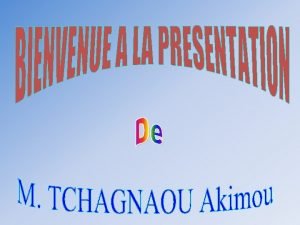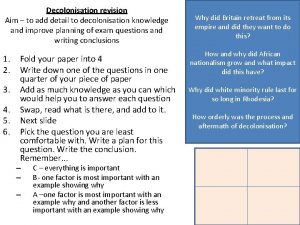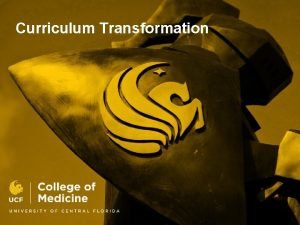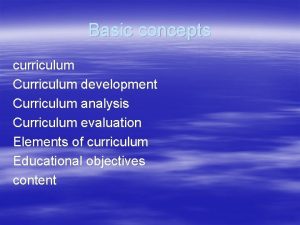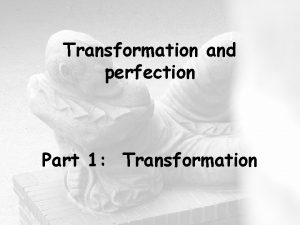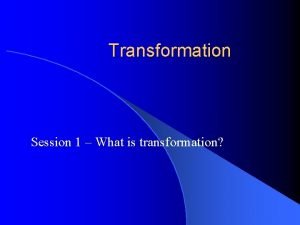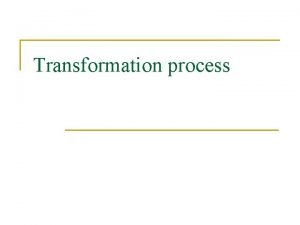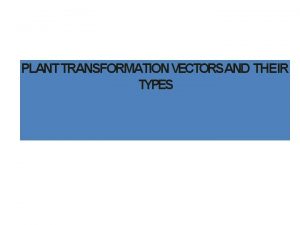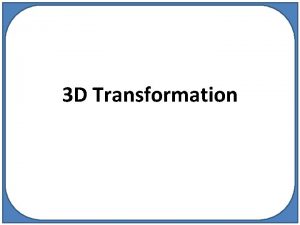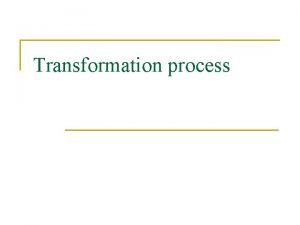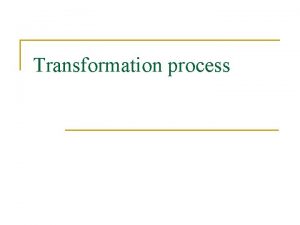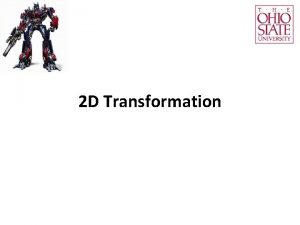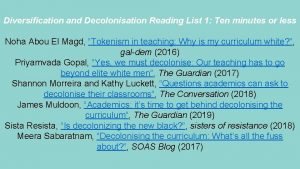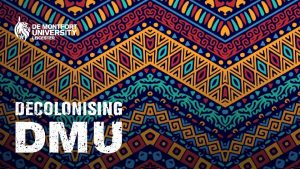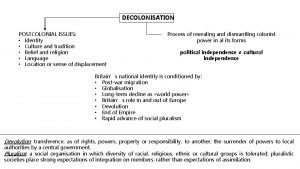DECOLONISATION AND TRANSFORMATION OF THE CURRICULUM AS THE


















- Slides: 18

DECOLONISATION AND TRANSFORMATION OF THE CURRICULUM AS THE VEHICLE FOR SOCIAL JUSTICE, EPISTEMIC ACCESS AND COGNITIVE JUSTICE by • Sechaba Mahlomaholo • NRF Rated Professor of Education and • The Deputy Vice-Chancellor for Academic Affairs and Research • Walter Sisulu University • mmahlomaholo@wsu. ac. za

OUTLINE OF THE PRESENTATION • SOME CHALLENGES TO EDUCATION AND CURRICULUM • SUSTAINABLE DEVELOPMENT GOALS: UNITED NATIONS • AGENDA 2063: AFRICA • NATIONAL DEVELOPMENT PLAN: SOUTH AFRICA • COLONISATION REVISISTED: ABYSSAL THINKING • DECOLONIALITY • CURRICULUM TRANSFROMATION: EPISTEMIC ACCESS AND COGNITIVE JUSTICE • THE FOURTH INDUSTRIAL REVOLUTION

SOME CHALLENGES TO EDUCATION AND CURRICULUM • Participation in Science and mathematics still a challenge in schools. • Teachers’ levels of mathematics knowledge is far below expectations • Teacher education needs to be vigorously based on diagnostic analysis and commitment of resources and time • Teaching of reading, writing and numeracy vigorously • Poor educator training, inadequate support of learners in their homes • Lack of books • Reducing number of teacher education colleges reduced capacity • Mentorship programmes for teachers • Significant number of teachers were trained in the previous dispensation

SUSTAINABLE DEVELOPMENT GOALS: UNITED NATIONS • • • • • Economic development of all in an environmentally sustainable manner for the social inclusion of all No poverty, No hunger, GOOD HEALTH AND WELL BEING, Quality education Gender Equality Clean water and sanitation, Affordable and clean energy, Decent work and economic development, Industry, innovation and infrastructure, Reduced inequality, Sustainable cities and communities, Responsible production and consumption, Climate action, life below water, Life on land, Peace and justice Strong Institutions, Partnership to acheve these goals

AGENDA 2063: AFRICA • ASPIRATION 1. A prosperous Africa based on inclusive growth and sustainable development • ASPIRATION 2. An integrated continent, politically united, based on the ideals of Pan-Africanism and the vision of Africa’s Renaissance • ASPIRATION 3. An Africa of good governance, democracy, respect for human rights, justice and the rule of law • ASPIRATION 4. A peaceful and secure Africa • ASPIRATION 5: An Africa with a strong cultural identity, common heritage, values and ethics • ASPIRATION 6: An Africa whose development is people-driven, relying on the potential of African people, especially its women and youth, and caring for children

AGENDA 2063: AFRICA • ASPIRATION 7: Africa as a strong, united and influential global player and partner • A major social, political and economic force in the world, with her rightful share of the global commons (land, oceans and space); • An active and equal participant in global affairs, multilateral institutions, and a driver for peaceful co-existence, tolerance and a sustainable and just world; and • Fully capable and have the means to nance her development.

NATIONAL DEVELOPMENT PLAN: SOUTH AFRICA • Lay a solid foundation for a long and healthy life • Build a properly qualified, professional, competent and committed teaching, academic, research and public service core • Building a strong and coherent set of institutions for delivering quality education, science and technology innovation, skills and training • Expand the pool of highly trained professionals and enhance the innovative capacity of the nation • Create an educational and national science system that serves the needs of the society

NATIONAL DEVELOPMENT PLAN • The importance of mother tongue is emphasised and integral to science and technology to the development and preservation of these languages • By 2030 schooling is characterised by highly motivated; principals are effective managers who provide administrative and curriculum leadership, parents are involved in schools that their children attend, committed and professional teachers, knowledgeable district officials support schools, learning materials are readily available • Eradicate under nutrition • Universal access to two years of early childhood development • About 80% of schools and learners achieve above 50% in literacy, mathematics and science in grade 3, 6 and 9

NATIONAL DEVELOPMENT PLAN • Increase the number of learners who are eligible to study mathematics at universities to 450 000 • South Africa improves its position in the international rankings. • About 80% of every cohort of learners complete the full 12 years of schooling • THE ARGUMENT IS THAT: DECOLONISATION AND TRANSFORMATION OF THE CURR

COLONISATION REVISISTED: ABYSSAL THINKING • From this perspective, abyssal thinking describes how European, Global North and Western thought have ever since time in memorial theorized and practically made invisible, irrelevant, useless, unnecessary, trivial and inconsequential other forms of knowledge, • Through aggressive processes of colonization these forms of European knowledges were imposed on the colonies and their ways of knowing. • The indigenous knowledges of the African people on the African continent and of those in the diaspora were buried deep down in the abyss where they thus could not be accessed and made visible and useful through centuries of colonization and marginalization, ranging from slavery to apartheid.

DECOLONIALITY • Decoloniality is seen as a continuing confrontation of, and extending beyond euro centrism. It questions and problematizes the histories of power emerging from Europe and the Global North. • In addition, it refers to a process of self-creation among the marginalised Africans on the continent and in the diaspora. In other words it is about creating new forms of life or selfappropriation. • Therefore, decoloniality is a response to the relation of direct, political, social and cultural domination established by the Europeans.

DECOLONIALITY • It includes confronting cultural domination as a point of departure, • Decoloniality is about a yearning for those inclusive practices, which existed before colonization, and the reimagination of how they can be broadened to include all as the curriculum is transformed. • Decoloniality advances the agenda for the social justice project that aims at advocating for the common goals of equity, cognitive justice, freedom, peace and hope through curriculum transformation.

CURRICULUM TRANSFROMATION • The process of curriculum transformation/decolonisation is a project aimed at bringing all those ‘discarded knowledges’ to the surface and integrating them into an inclusive repertoire of the powerful knowledges of the indigenous. • This implies that the latter are being validated and connected to those knowledges of the powerful Global North into a meaningful dialectical relationship of mutual respect and co-constituation. • Curriculum transformation is thus about inclusivity of knowledges and this implies that transforming the curriculum means affirming and reflecting everybody irrespective of their station in life. •

THE FOURTH INDUSTRIAL REVOLUTION • Animal Power 1. Steam power (First Industrial Revolution) 2. Electrical power (Second Industrial Revolution) 3. Digitalisation (Third Industrial Revolution) and 4. Industrial Internet of Things, Artificial Intelligence, (Fourth Industrial Revolution)

THE FOURTH INDUSTRIAL REVOLUTION • 1. Fourth Industrial Revolution is the infinite ability of humankind to store massive amounts of information and data as well as process them accurately through mind-boggling speeds (Ross, 2017). • 2. Industrie 4. 0 is the era of Artificial Intelligence where these data are transported over huge distances within seconds among infinite number of users. • 3. It is during this period that talk is about the Industrial Internet of Things (IIo. T) to capture these developments and achievements. • 4. According to Schwab (2017), Industrie 4. 0 is described as the Industry of Internet of Things (IIo. T) where billions of people are connected for example through social media at the same time but doing unlimited number of different things (Schuster, Groß, Vossen, Richert & Jeschke, 2016). • 5. Through this IIo. T, an infinite number of messages, services and products are moved across vast distances connecting people ubiquitously and infinitely

CONCLUSION: CURRICULUM EXCLUSION • Curriculum marginalizes through excluding learners through their physiological being by depriving them opportunities to grow and develop freely. • Their full potential to grow physiologically is truncated as a result of instances of malnourishment due to deprived backgrounds where they are condemned to live in. • Schools for the majority Black are usually not equipped to deal with instances of hunger and under nourishment presented by learners at such schools. Some of them come from homes where there is scarcity of meals. Curriculum that does not provide for such thus continues to exclude physiologically

CONCLUSION FINALLY: NEED FOR INCLUSION • Even psychologically schools seem to exclude learners who do not find acceptance therein as their backgrounds are not taken into consideration when curriculum issues are discussed. • Schools in these unequal contexts do not focus on their cultural backgrounds that inform who they are. • Curriculum thus undermines their psychological and cultural wellbeing as it consistently creates feelings of inferiority and not belonging by not including experiences from their everyday life. • Their languages are regarded as unimportant and incapable of communicating the complexities of knowledge that is shared in schools. Their histories are erased and buried very deep down under layers of colonial weight.

KE A LEBOHA THANK YOU NDIYABULELA
 Décolonisation du togo
Décolonisation du togo Hát kết hợp bộ gõ cơ thể
Hát kết hợp bộ gõ cơ thể Lp html
Lp html Bổ thể
Bổ thể Tỉ lệ cơ thể trẻ em
Tỉ lệ cơ thể trẻ em Gấu đi như thế nào
Gấu đi như thế nào Glasgow thang điểm
Glasgow thang điểm Chúa yêu trần thế alleluia
Chúa yêu trần thế alleluia Các môn thể thao bắt đầu bằng tiếng nhảy
Các môn thể thao bắt đầu bằng tiếng nhảy Thế nào là hệ số cao nhất
Thế nào là hệ số cao nhất Các châu lục và đại dương trên thế giới
Các châu lục và đại dương trên thế giới Công của trọng lực
Công của trọng lực Trời xanh đây là của chúng ta thể thơ
Trời xanh đây là của chúng ta thể thơ Mật thư tọa độ 5x5
Mật thư tọa độ 5x5 Làm thế nào để 102-1=99
Làm thế nào để 102-1=99 độ dài liên kết
độ dài liên kết Các châu lục và đại dương trên thế giới
Các châu lục và đại dương trên thế giới Thơ thất ngôn tứ tuyệt đường luật
Thơ thất ngôn tứ tuyệt đường luật Quá trình desamine hóa có thể tạo ra
Quá trình desamine hóa có thể tạo ra
